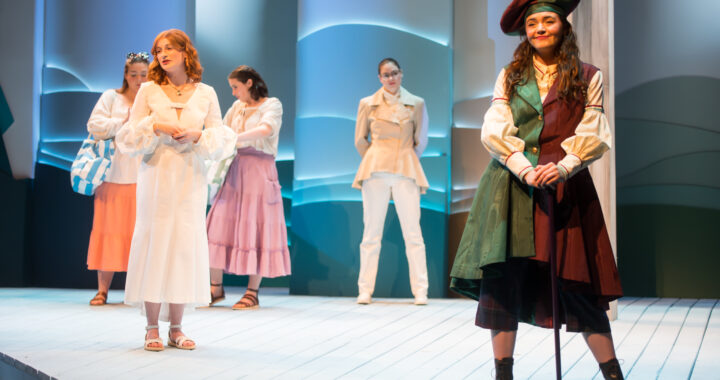Women’s History Month: 100 years of women in music
4 min read
Pixabay
By SHAWNYA PETERSON
Female musicians have a rich and complex history, and, over the past century, share much overlap with social movements of the era, including the fights for racial justice and LGBTQ equality. In celebration of Women’s History Month, we’re taking you decade by decade through the last 100 years of female musical artists.
- Some of these Days – Sophie Tucker (1911)
Sophie Tucker, a Jewish woman born to Ukrainian parents, was a vaudeville performer well-known in the era for her bawdy, risqué humor and audacious stage presence. Though initially pressured to perform in blackface when her managers believed her too unattractive to perform out of costume, Tucker later retired the routine and incorporated such criticisms into her later songs. Some of her most well-known numbers include “I Don’t Want to Get Thin,” “My Yiddishe Momme” and “Life Begins at Forty.”
- Nobody Knows When You’re Down and Out – Bessie Smith (1929)
Bessie Smith’s song “Nobody Knows When You’re Down and Out” quickly took on a new meaning when the stock market crashed just weeks after it was released in September of 1929. Smith was one of the most iconic black female blues singers of the 20s and 30s, and her classic song is, even today, one of her most well-known numbers.
- Strange Fruit – Billie Holiday (1939)
In her iconic 1939 song based on the poem by Abel Meeropol, Billie Holiday describes victims of lynching, calling the bodies “strange fruit…swinging in the southern breeze.” As a black woman, Holiday’s haunting melody was an unprecedentedly deep critique of racism in the Jim Crow south
- And Her Tears Flowed Like Wine – Ella Fitzgerald (1945)
Though jazz singer Ella Fitzgerald’s solo career first began in the early 1940s, her musical career was one spanning 60 years. She would go on to become one of the most notable musicians of the 20th century, collaborating with fellow black artists Duke Ellington and Louis Armstrong, among others.
- Trouble of the World – Mahalia Jackson (1959)
Mahalia Jackson was not only a gospel singer, but also a noted civil rights activist and close friend to the Reverend Dr. Martin Luther King Jr. Jackson worked closely with King throughout the movement, performing at the March on Washington, where King performed his “I Have a Dream” speech, as well as performing at King’s funeral after his murder in 1968. Jackson’s solemn rendition of an African-American spiritual was timely, echoing the hopes and struggles of the Civil Rights era, hearkening back to the roots of black America.
- You Don’t Own Me – Lesley Gore (1963)
Released in the early days of the 20th century women’s liberation movement, in Gore’s song, she speaks to a partner, telling them they don’t control what she says or does, finishing the song by saying “just let me be myself, that’s all I ask of you.”
- Feeling Good – Nina Simone (1965)
Renowned singer and civil rights activist Nina Simone’s song of growth and empowerment hearkens back to the civil rights and women’s liberation movements of the time.
- I Will Survive – Gloria Gaynor (1971)
Gloria Gaynor’s song speaks to a woman emotionally rebuilding herself after the end of a romantic relationship, overcoming the partner’s mistreatment and growing stronger as a result.
- I Am Woman – Helen Reddy (1978)
Helen Reddy’s song of female empowerment is easily one of most iconic songs to come from the woman’s liberation movement of the 60s and 70s. Reddy celebrates the gains women have made, while acknowledging the progress yet to be made, saying that “No one’s ever gonna keep me down again.” In the song, Reddy proudly proclaims the now-famous words, “I am woman, hear me roar.”
- I’m Coming Out – Diana Ross (1980)
While Motown artist Diana Ross’ song was originally written in celebration of her release from her record contract, it has since been adopted an unofficial LGBTQ-pride anthem, saying “there’s a new me coming out.”
- Nasty – Janet Jackson (1986)
While Janet Jackson’s number was originally released in the 80s as a song against catcalling, the already famous song has recently experienced an increase in popularity. Over the past few months, the song has gained a new meaning, gaining popularity with feminists and so-called “Nasty Women.”
- Enamorada De Ti – Selena (1992)
Selena Quintanilla was born in Texas to Mexican-American parents. Her heritage played a large part in her career in the Tejano music world, with many of her early songs featuring Mexican musical influence and Spanish lyrics. Despite her untimely death at 23 in 1995, her music has a lasting impact on and is a prime example of the blending of Mexican and American cultures.
- No Scrubs – TLC (1999)
TLC’s 1999 hit song is a criticism of cowardly men that hit on women by “hanging out the passenger side of his best friend’s ride, trying to holler at me.” After the song’s release, the term “scrub” became widespread in popular culture for a “deadbeat” guy.
- Can’t Hold Us Down – Christina Aguilera (2002)
Christina Aguilera’s early 2000’s pop song goes through some of the many double standards women face, criticizing how powerful women are treated in society. In the song, Aguilera calls on women to come together and stand up for each other, saying that they “can’t hold us down.”
- Run the World (Girls) – Beyoncé (2011)
Beyoncé Knowles’ song is an overt song of unapologetic female empowerment. Knowles, one of the most well-known feminists in Hollywood today, sings of “repping for the girls taking over the world.”











